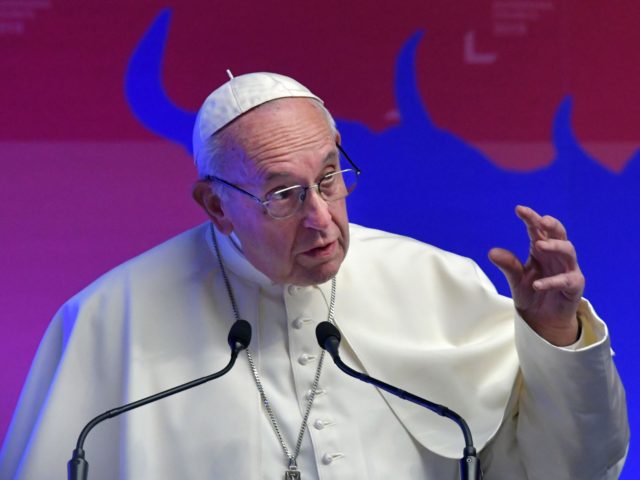ROME — Pope Francis urged a United Nations meeting on food security to prioritize the agricultural sector in the post-pandemic global “reset.”
“It is essential to recover the centrality of the rural sector, on which the satisfaction of many basic human needs depends,” the pope said in a Spanish-language message Monday to U.N. General Secretary António Guterres.
It is urgent, the pontiff continued, “that the agricultural sector regain a priority role in the process of political and economic decision-making, aimed at delineating the framework of the process of post-pandemic ‘reset’ being carried out.”
The 'Great Reset' is trending. You know what it is, right? https://t.co/VdV5FERYLz
— Breitbart News (@BreitbartNews) November 19, 2020
In the developed world, the agricultural sector has made up a progressively smaller percentage of the GDP of nations, primarily because of greater efficiency in food production and contemporaneous wealth creation.
Historically, the more affluent a country becomes, moving further and further away from a subsistence economy, the more the agricultural sector shrinks as a percentage of GDP, giving way to the industrial and service sectors.
In a country such as the United States, for example, the agricultural sector accounts for a mere 0.9 percent of GDP and in the United Kingdom, it accounts for even less, at only 0.6 percent of GDP. In a very poor country like Niger, on the other hand, the agricultural sector makes up 37.8 percent of the nation’s GDP.
In neighboring Chad, the figure is a stunning 47.7 percent.
In his address Monday, the pope asserted that the U.N. meeting “highlights how one of our greatest current challenges is to overcome hunger, food insecurity, and malnutrition in the era of COVID-19.”
The pandemic has made us face “systemic injustices that undermine our unity as a human family,” Francis said, with the poor and the Earth demanding “a radical change.”
The pope went on to blame hunger in the world on “powerful economic interests” that “prevent us from designing a food system that responds to the values of the common good, solidarity, and the ‘culture of encounter.’”
Pope Francis has repeatedly laid out his vision of the Great Reset needed to create a “New World Order” after the coronavirus pandemic.
'The Great Reset' is upon us. French President Macron declared that in the wake of the Chinese coronavirus modern capitalism "can no longer work" at the Davos summit. https://t.co/sbjyLz57U7
— Breitbart News (@BreitbartNews) January 31, 2021
In an op-ed for the New York Times last November, the pope wrote that this “is a moment to dream big, to rethink our priorities — what we value, what we want, what we seek — and to commit to act in our daily life on what we have dreamed of.”
“God asks us to dare to create something new,” he declared. “We cannot return to the false securities of the political and economic systems we had before the crisis. We need economies that give to all access to the fruits of creation, to the basic needs of life: to land, lodging and labor.”
“We need to slow down, take stock and design better ways of living together on this earth,” he proposed.
The Davos-based World Economic Forum (WEF) welcomed what it saw as the pontiff’s endorsement of its “Great Reset” program, highlighting the similarities between their visions.
In an article titled “Here’s the pope’s prescription for resetting the global economy in response to COVID-19,” the WEF declared that Francis had “put his stamp on efforts to shape what’s been termed a Great Reset of the global economy in response to the devastation of COVID-19.”
DELINGPOLE: "The Great Reset is real, it’s happening now and will lead to devastation worse — “much, much worse” — than the Weimar Republic, a German economist has warned." https://t.co/VRI4VXhX43
— Breitbart News (@BreitbartNews) December 27, 2020
“Pope Francis has issued a scathing indictment of neoliberalism,” the WEF declared, “a philosophy espousing austerity, privatization, deregulation, unbridled markets, and relatively weak labour laws.”
Moreover, the pope “blames the ‘dogma’ of neoliberal economics for making us more vulnerable to COVID-19,” it states, while calling for “greater multilateral cooperation and a focus on human dignity,” it said.
“Neoliberalism’s free-market orthodoxy has been blamed for making health care systems and livelihoods especially vulnerable to the pandemic, and has drawn a clearer line under the need for active government intervention,” the article asserted.
In Monday’s address, Francis said that we now “have the responsibility to bring about the dream of a world where bread, water, medicine, and work flow in abundance and reach the neediest first.”

COMMENTS
Please let us know if you're having issues with commenting.